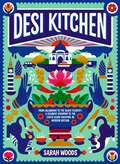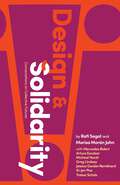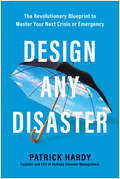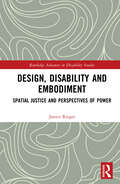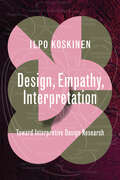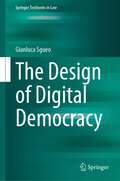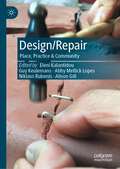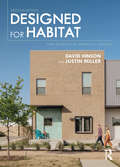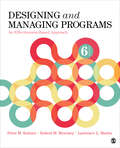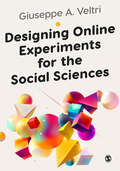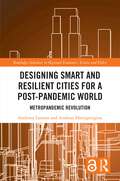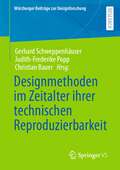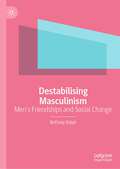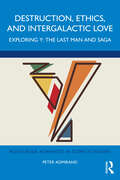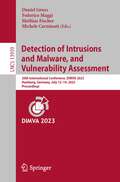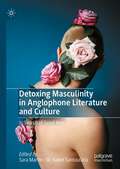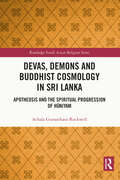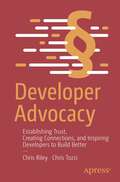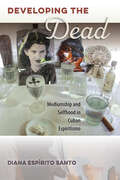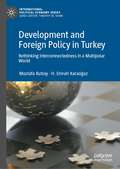- Table View
- List View
Desi Kitchen
by Sarah WoodsJoin Sarah Woods on a mouth-watering celebration of British and South Asian fusion recipes, featuring the Desi communities who created them'I've longed for a book like this. A fascinating read with glorious recipes' DIANA HENRY'An evocative visual feast that speaks to your very heart. The mouth-watering recipes leap off the page and I am left wanting to bookmark nearly every dish' LARA LEE, author of Coconut and Sambal'Beautiful book, great recipes, really well written and original' PRUE LEITH____________Sarah Woods has spent her whole life surrounded by a fusion of South Asian and British cooking. Now, she speaks to the many desi communities across the UK to provide a unique culinary roadmap to the diaspora of the Indian subcontinent in Britain today.Travelling from the Pakistani community of Glasgow to the Nepalese community of Kent and everywhere in between, the book explores how groups from different regions have blended their food and culture to create a cuisine that is distinct, special and diverse.With Sarah's expert guidance, you will . . .- Cook Gujarati Hasselback Potato Shaak for an alternative take on a side dish- Make a Ugandan Chapatti Rolex for a great way to use leftover curry- Sticky and Spicy Mango Chicken Wings are quick and easy to make and finger licking good- Try Welsh Chilli Rarebit with curry oil and crispy shallots- Dive into Peshawari Bread and Butter Pudding with honeyed figsPacked with recipes, stories and authentic voices from each of the communities covered, Sarah Woods, finalist of BBC One's Britain's Best Home Cook and herself a second-generation Punjabi, has brought together this collection of mouth-watering dishes and provided a rare and privileged glimpse into desi kitchens from all over modern Britain.____________'A mesmerising cookbook filled with gorgeous recipes from Desi kitchens all over modern Britain' ATUL KOCHHAR
Design and Solidarity: Conversations on Collective Futures
by Rafi Segal Marisa Morán JahnIn times of crisis, mutual aid becomes paramount. Even before the COVID-19 pandemic, new forms of sharing had gained momentum to redress precarity and stark economic inequality. Today, a diverse array of mutualistic organizations seek to fundamentally restructure housing, care, labor, food, and more. Yet design, art, and architecture play a key role in shaping these initiatives, fulfilling their promise of solidarity, and ensuring that these values endure.In this book, artist Marisa Morán Jahn and architect Rafi Segal converse about the transformative potential of mutualism and design with leading thinkers and practitioners: Mercedes Bidart, Arturo Escobar, Michael Hardt, Greg Lindsay, Jessica Gordon Nembhard, Ai-jen Poo, and Trebor Scholz. Together, they consider how design inspires, invigorates, and sustains contemporary forms of mutualism—including platform cooperatives, digital-first communities, emerging currencies, mutual aid, care networks, social-change movements, and more. From these dialogues emerge powerful visions of futures guided by communal self-determination and collective well-being.
Design Any Disaster: The Revolutionary Blueprint to Master Your Next Crisis or Emergency
by Patrick HardyNever experience a disaster again—ever.Hurricanes, wildfires, mass shootings, and pandemics are a reality for 21st century families and small businesses. But here&’s the truth: Not one of these has to be a disaster. What determines whether an unexpected event becomes a disaster is you. In Design Any Disaster, certified emergency manager and master business continuity practitioner Patrick Hardy reveals to you the secrets of disaster preparedness that helped him build the largest and most successful small business and family disaster planning company in the world.He explains why: You should never, ever &“remain calm&” during a disaster.99% of all disaster plans are a complete waste of time.Fancy disaster equipment and supplies actually leave you less prepared. Design Any Disaster is not a survival manual. It&’s a revolutionary approach to disaster preparedness, response, and recovery for families and small businesses that can be used whether you live in the middle of a big city, in a quiet suburban neighborhood, or in a rural county with more cows than people. Using the powerful C3 Method Hardy uses with his clients, from Fortune 500 CEOs to average families, you will discover how to get ready (plan effectively), react (focus without panicking), respond (protect yourself and your possessions), and recover (overcome swiftly). And in a revolutionary section you will not find in any other disaster book, Hardy also reveals how to reverse disaster, converting the experience into an opportunity to become wiser and happier. Control the disaster so that it doesn&’t control you—that&’s how you Design Any Disaster.
Design, Disability and Embodiment: Spatial Justice and Perspectives of Power (Routledge Advances in Disability Studies)
by Janice RiegerThis timely book explores the spatial and social injustices within our streets, malls, schools, and public institutions. Taken-for-granted acts like going for a walk, seeing an exhibition with a friend, and going to school are, for people with disabilities, conditional or precluded acts due to exclusion by design. This book stimulates debate and discussion about current practice and studies in spatial design in the context of disability and the growing need for inclusive design globally. Case studies of inclusive design in spaces like museums, malls, galleries and universities are presented to challenge and expose the perspectives of power and spatial injustices that still exist within these spaces today. The international case studies presented purposely privilege the voices and perspectives of people with disabilities, to expose the multisensorial perspectives of spatial justice in order to understand inclusion more holistically through embodiment. If you are an architect, designer, arts educator, curator or museum professional or just want a world where spatial justice is possible, then this book will provide you with a new perspective of spatial design through critical disability studies, allyship and codesign, where tangible approaches and practices for inclusive design are explored.
Design, Empathy, Interpretation: Toward Interpretive Design Research (Design Thinking, Design Theory)
by Ilpo KoskinenA new, empathic approach to design research, drawn from the informed experiences of a leading design research program in Finland.Design, Empathy, Interpretation tells the story of empathic design, a design research program at Aalto University in Helsinki, Finland, that has developed an interpretive approach to design over the past twenty years. As one of the leaders of the Helsinki group, Ilpo Koskinen draws on his own experiences to offer readers a general intellectual and professional history of design research, and argues for what he calls an interpretive approach. Design, Empathy, Interpretation shows how the group has created connections all across the globe, and how a seemingly soft approach to design research can be useful in both industry and government.Koskinen follows design research&’s transformation from questions of usability, in the 1980s, through to the revolution in personal electronics and the &“user-centered&” turn of the 1990s. Using the research community in Helsinki as a case study, and moving between specific projects and theoretical debates, he offers readers a focused introduction to the major methodological and intellectual challenges—as well as the opportunities—of design research. He argues that all design tasks, however simple or complex, begin with understanding the way humans ascribe meaning, both as individuals and as actors in complex societies. Thus all design research must be interpretive at its core.A new, empathic approach to design research, drawn from the informed experiences of a leading design research program in Finland.
The Design of Digital Democracy (Springer Textbooks in Law)
by Gianluca SgueoEver-stronger ties between technology, entertainment and design are transforming our relationship with democratic decision-making. When we are online, or when we use digital products and services, we tend to focus more on certain factors like speed of service and user-friendliness, and to overlook the costs – both for ourselves and others. As a result, a widening gap separates our expectations of everything related to digitalization – including government – and the actual practice of democratic governance. Democratic regulators, unable to meet citizens’ demands for tangible, fast and gratifying returns, are seeing the poorest results ever recorded in terms of interest, engagement and retention, despite using the most cutting-edge technologies. This book explores various aspects of the relationship between democracy, technology and entertainment. These include, on the one hand, the role that digital technology has in strengthening our collective intelligence, nurturing empathic relations between citizens and democratic institutions, and supporting processes of political aggregation, deliberation and collaboration. On the other hand, they comprise the challenges accompanying digital technology for representation, transparency and inclusivity in democratic decision-making. The book’s main argument is that digital democratic spaces should be redesigned to narrow the gap between the expectations and outcomes of democratic decision-making. It suggests abandoning the notion of digital participatory rights as being fast and easy to enjoy. It also refutes the notion that digital democratic decision-making can only be effective when it delivers rapid and successful responses to the issues of the day, regardless of their complexity. Ultimately, the success or failure of digital democracy will depend on the ability of public regulators to design digital public spaces with a commitment to complexity, so as to make them appealing, but also effective at engaging citizens.
Design/Repair: Place, Practice & Community
by Eleni Kalantidou Guy Keulemans Abby Mellick Lopes Niklavs Rubenis Alison GillThis collection of essays sheds light on repair as a disposition to material culture and a practice rooted in diverse sociocultural experiences. It provides an in-depth exploration of how repair manifests itself through the different lenses of governance, grassroots activism, transformative design and community-led initiatives. Most importantly, the chapters demonstrate how place-based approaches can reveal blueprints for social impact in circumstances of growing environmental and social precariousness.
Designed for Habitat: New Directions for Habitat for Humanity
by David Hinson Justin MillerDesigned for Habitat: New Directions for Habitat for Humanity presents 12 new projects designed and built via collaborations between architects and Habitat for Humanity®. The ways in which we think about affordable housing are being challenged by designers and not-for-profit housing advocates such as Habitat for Humanity and its affiliates. The projects chronicled in this book consider home affordability through the lens of monthly homeownership expenses, energy efficiency and residential energy use, and issues of designed resilience to natural events ranging from aging and accessibility concerns to natural disasters and climate change. New to this edition, the projects reflect new approaches to building scale, construction technology, energy and affordability, and design and context. Illustrated with over 100 color images, the case studies include detailed plans and photographs to show how these projects came about, the strategies used by each team to approach the design and construction process, and the obstacles they overcame to realize a successful outcome. The lessons and insights presented will be a valuable resource, whether you’re an architect, an architecture student, a Habitat affiliate leader, or an affordable housing advocate.
Designing and Managing Programs: An Effectiveness-Based Approach
by Peter M. Kettner Lawrence L. Martin Robert M. MoroneyThis classic text for social work and human services helps readers grasp the meaning and significance of measuring performance and evaluating outcomes. Hands-on and practical, Designing and Managing Programs incorporates the principles of effectiveness-based planning as it addresses the steps of designing, implementing, and evaluating a human services program at the local agency level. Written by leaders in the field, it guides students through the process from beginning to end. Meaningful examples—from problem analysis and needs assessment to evaluating effectiveness and calculating costs—enhance reader understanding of how concepts are implemented in the real world. The Sixth Edition contains new examples and references, and updates based on changes to federal regulations. An instructor website includes essay questions, PowerPoint slides, and suggested assignments designed by the authors.
Designing and Managing Programs: An Effectiveness-Based Approach
by Peter M. Kettner Lawrence L. Martin Robert M. MoroneyThis classic text for social work and human services helps readers grasp the meaning and significance of measuring performance and evaluating outcomes. Hands-on and practical, Designing and Managing Programs incorporates the principles of effectiveness-based planning as it addresses the steps of designing, implementing, and evaluating a human services program at the local agency level. Written by leaders in the field, it guides students through the process from beginning to end. Meaningful examples—from problem analysis and needs assessment to evaluating effectiveness and calculating costs—enhance reader understanding of how concepts are implemented in the real world. The Sixth Edition contains new examples and references, and updates based on changes to federal regulations. An instructor website includes essay questions, PowerPoint slides, and suggested assignments designed by the authors.
Designing Online Experiments for the Social Sciences
by Giuseppe VeltriThis book guides you through designing and implementing an online experiment in social science research in a clear and straightforward manner. At an approachable pace, it covers foundational principles of good experimental design before setting out best practice for how to design and conduct web experiments, taking into account the specific methodological challenges of working online with digital tools. The book: Offers practical advice for approaching every stage of the research process Breaks real-world examples into easy to follow steps Focuses on how to make good decisions and choose the right design for your research project This pragmatic guide helps beginner researchers get started with online experiments confidently. It is supported by online resources such as case studies which allow you to see the concepts in practice, and weblinks to tools and resources to aid you.
Designing Online Experiments for the Social Sciences
by Giuseppe VeltriThis book guides you through designing and implementing an online experiment in social science research in a clear and straightforward manner. At an approachable pace, it covers foundational principles of good experimental design before setting out best practice for how to design and conduct web experiments, taking into account the specific methodological challenges of working online with digital tools. The book: Offers practical advice for approaching every stage of the research process Breaks real-world examples into easy to follow steps Focuses on how to make good decisions and choose the right design for your research project This pragmatic guide helps beginner researchers get started with online experiments confidently. It is supported by online resources such as case studies which allow you to see the concepts in practice, and weblinks to tools and resources to aid you.
Designing Smart and Resilient Cities for a Post-Pandemic World: Metropandemic Revolution (Routledge Advances in Regional Economics, Science and Policy)
by Anthony Larsson Andreas HatzigeorgiouAre pandemics the end of cities? Or do they present an opportunity for us to reshape cities in ways making us even more innovative, successful, and sustainable? Pandemics such as COVID-19 (and comparable disruptions) have caused intense debates over the future of cities. Through a series of investigative studies, Designing Smart and Resilient Cities for a Post-Pandemic World: Metropandemic Revolution seeks to critically discuss and compare different cases, innovations and approaches as to how cities can utilise nascent and future digital technology and/or new strategies in order to build stronger resilience to better tackle comparable large-scale pandemics and/or disruptions in the future. The authors identify ten separate societal areas where future digital technology can impact resilience. These are discussed in individual chapters. Each chapter concludes with a set of proposed "action points" based on the conclusions of each respective study. These serve as solid policy recommendations of what courses of action to take to help increase the resilience in smart cities for each designated area. Securing resilience and cohesion between each area will bring about the metropandemic revolution. The book features a foreword by Nobel laureate Peter C. Doherty and an afterword by Professor of Urban Technologies, Carlo Ratti. It provides fresh and unique insights on smart cities and futures studies in a pandemic context, offers profound reflections on contemporary societal functions and the needs to build resilience and combines lessons learned from historical pandemics with possibilities offered by future technology.
Designmethoden im Zeitalter ihrer technischen Reproduzierbarkeit (Würzburger Beiträge zur Designforschung)
by Gerhard Schweppenhäuser Judith-Frederike Popp Christian BauerDie Beiträge in diesem Band spiegeln den Stand der Reflexions- und Forschungsprozesse an der Fakultät Gestaltung der TH Würzburg-Schweinfurt, der HBKsaar und der New Design University in St. Pölten. Sie repräsentieren einen Prozess der Aufklärung, dessen Prüfstein Walter Benjamins Frage ist, wie sich ›die Art und Weise der Sinneswahrnehmung‹ geschichtlich gewachsener Kollektive durch neue Medientechnologien verändert.
Destabilising Masculinism: Men’s Friendships and Social Change
by Brittany RalphThis book explores how two generations of relatively privileged Australian men have navigated the complex terrain of same-gender friendship across their lives, to offer both empirically unique and theoretically significant insights into the mechanics of social change in masculinities. Applying a feminist poststructuralist lens to data from in-depth interviews with 14 pairs of fathers and sons, it details how masculinist discourses of emotion and intimacy have governed the participants’ friendship practices at three chronological timepoints: fathers’ early lives and later lives, and sons’ early lives. A clear but complicated shift emerges, such that the commitment to stoicism and self-reliance dominant in the fathers’ early lives has given way to a growing embrace of intimacy and emotional expression within their and their son's contemporary same-gender friendships. Engaging with key debates in the field of critical studies on men and masculinities (CSMM), this book offers an alternative to the conceptualisation of this positive change as either representative of a holistic disintegration of hegemonic structures, or a superficial behavioural shift that is largely inconsequential to the gender order. Rather, it illustrates that the increasing influence of feminist, queer-inclusion and therapeutic discourse has destabilised masculinism in the context of men’s friendships, offering men an alternative subject position that allows care, expressiveness and intimacy. This book will be of interest to scholars in Gender and Sexuality Studies, and Masculinity Studies.
Destruction, Ethics, and Intergalactic Love: Exploring Y: The Last Man and Saga (Routledge Advances in Comics Studies)
by Peter AdmirandDestruction, Ethics, and Intergalactic Love: Exploring Y: The Last Man and Saga offers a creative and accessible exploration of the two comic book series, examining themes like nonviolence; issues of gender and war; heroes and moral failures; forgiveness and seeking justice; and the importance of diversity and religious pluralism. Through close interdisciplinary reading and personal narratives, the author delves into the complex worlds of Y and Saga in search of an ethics, meaning, and a path resonant with real-world struggles. Reading these works side by side, the analysis draws parallels and seeks common themes around the four central ideas of seeking and making meaning in a meaningless world; love and parenting through oppression and grief; peacefulness when surrounded by violence; and the perils and hopes of diversity and communion. This timely and thoughtful study will resonate with scholars and students of comic studies, media and cultural studies, philosophy, theology, literature, psychology, and popular culture studies.
Detection of Intrusions and Malware, and Vulnerability Assessment: 20th International Conference, DIMVA 2023, Hamburg, Germany, July 12–14, 2023, Proceedings (Lecture Notes in Computer Science #13959)
by Daniel Gruss Federico Maggi Mathias Fischer Michele CarminatiThis book constitutes the proceedings of the 20th International Conference on Detection of Intrusions and Malware, and Vulnerability Assessment, DIMVA 2023, held in Hamburg, Germany, in July 2023. The 12 full papers and 1 short paper presented in this volume were carefully reviewed and selected from 43 submissions. The papers are organized in thematical sections named: Side Channels Attacks; Security and Machine Learning; Cyber Physical System Security; Security Issues when Dealing with Users; Analysis of Vulnerable Code; Flow Integrity and Security.
Detoxing Masculinity in Anglophone Literature and Culture: In Search of Good Men
by Sara Martín M. Isabel SantaulàriaThis edited volume rethinks Masculinity Studies by breaking away from the notion of the perpetual crisis of masculinity. It argues that not enough has been done to distinguish patriarchy from masculinity and proposes to detox masculinity by offering a collection of positive representations of men in fictional and non-fictional texts. The editors show how ideas of hegemonic and toxic masculinity have been too fixed on the exploration of dominance and subservience, and too little on the men (and the male characters in fiction) who behave following other ethical, personal and socially accepted patterns. Bringing together research from different periods and genres, this collection provides broad, multidisciplinary insights into alternative representations of masculinity.
Deutsch-jüdische Begegnungen mit dem Buddhismus: Zwischen Moses und Buddha, 1890-1940
by Sebastian MuschIn Deutschland verwandelte sich der Buddhismus um die Jahrhundertwende von einem obskuren Thema, das nur für einige wenige Gelehrte von Interesse war, in ein kulturelles Phänomen. Viele der bedeutendsten Autoren dieser Zeit wurden von diesem rasanten Aufstieg des Buddhismus tiefgreifend beeinflusst - unter ihnen einige der bekanntesten Namen des deutsch-jüdischen Kanons. Sebastian Musch gräbt diese vernachlässigte Dimension deutsch-jüdischer Identität aus und zeichnet anhand von philosophischen Abhandlungen, Romanen, Essays, Tagebüchern und Briefen die Geschichte der jüdisch-buddhistischen Begegnungen bis zum Beginn des Zweiten Weltkriegs nach. Franz Rosenzweig, Martin Buber, Leo Baeck, Theodor Lessing, Jakob Wassermann, Walter Hasenclever und Lion Feuchtwanger werden neben anderen, weniger bekannten Persönlichkeiten wie Paul Cohen-Portheim und Walter Tausk vorgestellt. Wie Musch zeigt, verhandelten diese Denker, als sie über den Buddhismus schrieben, auch ihr eigenes Jüdischsein.
Deutsche Kino-Wochenschau und der wirtschaftliche Aufschwung in West und Ost: Audiovisuelle Gestaltung und Vermittlungsstrategie in Fallanalysen (1950-1965)
by Sigrun LehnertIn der Zeit des wirtschaftlichen Aufschwungs Deutschlands nach dem Zweiten Weltkrieg waren die Wochenschauen im Vorprogramm jeder Kinovorstellung eine bedeutende Informationsquelle. Mit eindrucksvollen Bildern auf einer großen Leinwand – begleitet von gesprochenem Kommentar, Musik und Geräusch – gaben sie Orientierung und prägten die Erinnerung. In zahlreichen dokumentarischen Film- und Fernsehformaten werden bis heute einzelne Bilder oder kurze Sequenzen aus der Kino-Wochenschau als historische Belege, als Illustrationen oder zur Dramatisierung verwendet. Die außergewöhnlichen Prinzipien der Informationsvermittlung kommen dabei jedoch nicht mehr zur Geltung. Um das Publikum zu erreichen, war damals eine Mischung aus informativen Berichten und unterhaltenden Beiträgen unerlässlich. Die in diesem Buch vorgenommenen Fallanalysen spiegeln elementare Themenbereiche der Zeit des wirtschaftlichen Aufschwungs beider deutscher Staaten (1950-1965) wider. Neben den Prinzipien der audiovisuellen Gestaltung wird auch die zentrale Vermittlungsstrategie herausgearbeitet. Transmediale und transnationale Aspekte, die hierbei eine Rolle spielen, weisen die Wochenschau als Teil eines (internationalen) Mediensystems aus.
Deutschland und Europa im Umbruch: Einstellungen, Verhalten und Forschungsperspektiven im Kontext der Bundestagswahl 2017 und der Europawahl 2019 (Wahlen und politische Einstellungen)
by Kathrin Ackermann Heiko Giebler Martin ElffUmbrüche und Krisen führen zu drastischen Veränderungen und bedingen Wandel – nicht zuletzt mit Blick auf politische Einstellungen und politisches Verhalten sowie den politischen Wettbewerb. Mit einem Schwerpunkt auf die Bundestagswahl 2017 und die Europawahl 2019 analysieren die Beiträge in diesem Band das Wahlverhalten in Deutschland und Europa vor dem Hintergrund dieser politischen und gesellschaftlichen Veränderungen.
Devas, Demons and Buddhist Cosmology in Sri Lanka: Apotheosis and the Spiritual Progression of Hūniyam (Routledge South Asian Religion Series)
by Achala Gunasekara-RockwellThis book examines the worship of devas and demons in Sri Lanka, illustrating how diverse influences interacted to create the Sinhala Buddhist cosmology. The work explains the processes by which apotheosis plays an important role in revitalizing that cosmology. The author offers an examination of holy sites associated with the worship of Hūniyam. These sacred spaces each have a unique background historically, and the ritualists associated with these sites have divergent understandings concerning Hūniyam. Building upon the examination of the temples, the book delves into the iconography of Hūniyam, illustrating his transformation from demon to deity in the manner that he is depicted in imagery associated with his worship. The book moves to a discussion of Ariṭṭa Kivenḍu Perumāl, a South Indian adventurer, demonstrating the likelihood that he is the historical figure later apotheosized as Hūniyam. Sri Lankan society felt his impact so strongly, that in death he became a demon in the Sinhala Buddhist cosmology. Finally, the book demonstrates that the same apotheosis processes are at work today. This book will be of interest to researchers and students engaged in the study of religion, anthropology, folklore, and history, specifically in the South Asian context.
Developer Advocacy: Establishing Trust, Creating Connections, and Inspiring Developers to Build Better
by Chris Riley Chris TozziNo matter which point you're currently at on the developer advocacy journey – whether you've already implemented a developer advocate function or you're exploring the possibility – this book is for you. This book provides actionable guidance that business and technology leaders can use to understand the benefits of advocacy, identify what goes into the function, and learn how to maximize the success of developer advocate teams.Developer advocacy is a role that is sometimes hard to quantify and build – but you feel it when you’re missing it. Companies are struggling to solidify advocacy despite a strong desire to do so and little guidance exists for businesses seeking to build a developer advocacy program or assess its effectiveness. This book will show you how to get an advocacy program in your business: the basics of having an advocacy program, what tasks and processes need to be set up, and how to identify key stakeholders. You'll see how companies of all types that sell to or engage with technical audiences can develop a developer advocacy strategy. Specifically, you'll learn what developer advocates do, how business can start an advocacy practice in your organization and how to scale and operationalize such a practice once it is in place. The book will further explore the metrics for measuring advocacy success and ways the scale advocacy teams internally and externally. The Power of Developer Advocacy explores the exciting career path of advocacy for developers and engineers. What You Will LearnDiscover what developer advocacy isDetermine which sorts of companies need the functionUnderstand what the primary strategic considerations for developer advocacy isWho This Book is For Existing and future advocacy leaders, would-be developer advocates, developer marketers and DevRel teams and leaders
Developing the Dead: Mediumship and Selfhood in Cuban Espiritismo
by Diana Espírito SantoBased on extensive fieldwork among espiritistas and their patrons in Havana, this book makes the surprising claim that Spiritist practices are fundamentally a project of developing the self. When mediums cultivate relationships between the living and the dead, argues Diana Espírito Santo, they develop, learn, sense, dream, and connect to multiple spirits (muertos), expanding the borders of the self. This understanding of selfhood is radically different from Enlightenment ideas of an autonomous, bounded self and holds fascinating implications for prophecy, healing, and self-consciousness. Developing the Dead shows how Espiritismo’s self-making process permeates all aspects of life, not only for its own practitioners but also for those of other Afro-Cuban religions.
Development and Foreign Policy in Turkey: Rethinking Interconnectedness in a Multipolar World (International Political Economy Series)
by Mustafa Kutlay H. Emrah KaraoğuzThis book sketches an institutional political economy framework to discuss the interaction between development and foreign policy in the global South with reference to Turkey. The authors argue that although the developmental state framework has commonly been employed to explore domestic economic development processes without analytically focusing on the foreign policy dimension, developmental state institutions are highly relevant in the creation and pursuit of a development-oriented foreign policy at a time of growing uncertainty marred by geopolitical and geoeconomic tensions. The book develops a two-level ‘Regime Coherence Framework’ to account for the domestic and international dimensions of development-oriented foreign policy. The main argument posits that the development regime in Turkey and associated foreign policies lack coherence, due to weak institutional complementarities between economic governance, state-business relations, and financial statecraft at the domestic-external nexus.
